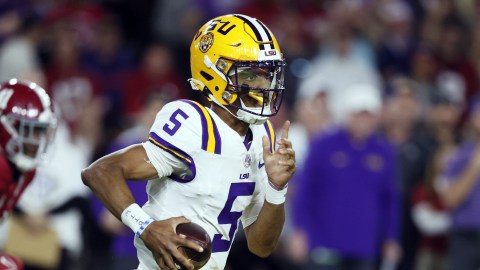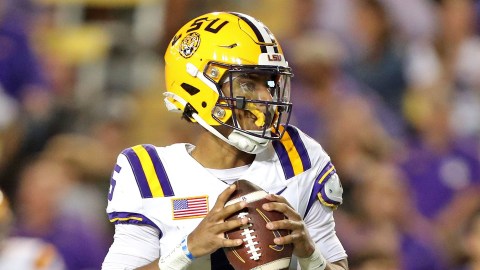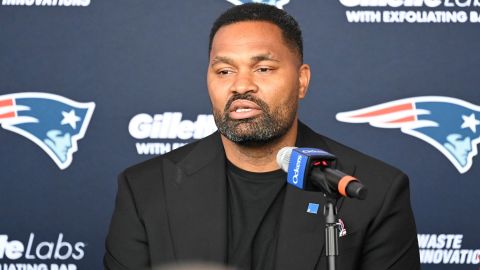A first-class flight to Los Angeles. A welcoming party equipped with signs, balloons and plenty of pizazz. A banquet held at an Orange County yacht club dedicated strictly to you. Even your own parade at Disneyland.
It sounds like a week fit for a king. But in actuality, it's a week fit for the last pick of the NFL draft.
For some, that week might rival the length of their NFL career. For others, such as former New England Patriots linebacker Marty Moore, Irrelevant Week served as an appropriate celebration to the start of an admirable eight-year tenure in pro football.
Since 1976, the last pick of the NFL draft has been dubbed "Mr. Irrelevant," a tradition that was started by former wide receiver Paul Salata, who also founded Irrelevant Week. Mr. Irrelevant receives a trophy, which spoofs college football's Heisman Trophy, and a week in the spotlight.
"I look back, and it was fun," said Moore, who was selected by the Patriots with the last pick of the 1994 draft. "It was good for me because people remembered who I was. I was the underdog in Boston, and I go back. The company I work for is based out of Raynham, Mass., and I go back and people are like, 'Marty Moore, you're Mr. Irrelevant.' They still know you." (Read more about Moore's experience as Mr. Irrelevant here.)
Moore looks back on the title with the fondest of memories, but at first, he thought the whole dog and pony show was a gag. The former Kentucky linebacker went through an array of emotions during draft weekend. He was at his mother's house with his five siblings in Fort Thomas, Ky., and didn't really pay much attention to the television during the draft's Saturday broadcast. Prior to the draft, Moore was told he'd be selected in the fourth or fifth round, so until then, he kept himself busy by painting a bedroom.
Moore casually glanced at the ticker in the fourth round but still managed to reserve his excitement. Eventually, though, he saw too many familiar faces go off the board, and his nerves became uncontainable.
"I start seeing all of these guys who were taken in front of me — guys who might have been a half-inch taller than me, maybe did one more bench press at the combine, just little, minute things," Moore said. "I kept saying to myself, 'Man, if they just watched me on tape, I don't know how these guys would have gotten drafted higher than I did.'"
By the end of the sixth round, Moore said he fielded about eight calls from various teams that were interested in his services. The Bengals told him they were going to draft him, but that obviously never panned out. Other teams said they wanted to sign him if he went undrafted.
Then, Patriots defensive coordinator Al Groh called Moore to tell him they were going to select him with the fourth pick of the seventh round. Moore was "shocked" because he had very little interaction with the Patriots leading up to the draft. They sent a scout to work him out, but Moore never worked out for a position coach, nor was he interviewed by anyone in the organization. Yet, Groh said he heard high remarks from a Dolphins positional coach and also watched Moore's film, which led to that phone call.
Then, with the fourth pick of the seventh round, the Patriots took Howard University quarterback Jay Walker. Major buzzkill, right? So, Moore assumed he was duped and angrily gathered his bags. He told his mother he was about to pack up his car and head back to the University of Kentucky to finish up his last semester and get his degree. But before he could get that second foot out the door, the Patriots had one last selection to make.
"The Patriots came back up again," Moore said, "and [I hear], 'Marty Moore, linebacker, University of Kentucky,' and my family is jumping up and down, and high-fiving and excited. I'm thinking, 'Holy smokes, I'm the last guy drafted.'"
Minutes later, Moore got a call from then-Patriots head coach Bill Parcells, who welcomed him to the team, mentioned he'd get a bump in pay for being drafted and, by the way, Salata would be calling Moore about a trip to California. There were 221 players selected in front of Moore, but Salata didn't care about any of them. He only wanted to speak with Moore, who was 1994's Mr. Irrelevant.
"I asked [Parcells]," Moore recalled, "'Are you serious? Is this a joke?'"
Sure enough, Salata phoned soon after, describing the events of Irrelevant Week. But even after that call, Moore was stuck in an "Are you kidding me?" mindset. Sixteen years ago, the NFL draft received a fraction of the attention it gets today, so the thoughts of Mr. Irrelevant, a free trip to California and a rendezvous with Mickey Mouse seemed a little absurd for a guy who was just the last player drafted.
"My family all thought the guy was just pulling my leg," Moore said. "They were excited that I got drafted, but they were like, 'Who is this guy? Is this real?' My family started researching and tried to find out if Mr. Irrelevant and Irrelevant Week was a legitimate thing because no one had ever heard of it."
Skepticism aside, Moore boarded a plane for the West Coast. The airport welcoming party brought Moore back to the Balboa Yacht Club in Orange County. He toured the harbor and returned to the club, where he was greeted by a large party of people who were all cheering his name. Throughout the week, Moore also visited Universal Studios Hollywood and Disneyland (where he was featured in a parade), and went fishing, participated in nightly contests and played in a theme-driven golf tournament. Moore and his group were forced to play one hole where kids bombarded them with water balloons. They had to play another while using only their putters.
"It was a lot of fun," Moore said. "It's not like people are trying to make fun of you because of where you're drafted or anything, but it's just a fun week for the people of Orange County and the people that are involved with it. They kind of give you a hard time here and there, but it's all in good fun. It's not distasteful or anything that makes you feel like you're not a good football player or you're not going to make it in the NFL."
The truth of the matter, though, is most seventh-rounders don't make it in the NFL, but Moore was a big-time exception. He worked hard and showed his versatility in his rookie training camp — when he was sarcastically dubbed "Mr. Insignificant" by his new teammates — and instantly earned a role on special teams.
Then, when Todd Collins got hurt early in the year, Moore became the Patriots' starting weak inside linebacker — in the process, becoming the first Mr. Irrelevant in history to start a game as a rookie. He would eventually become the first Mr. Irrelevant to play in the Super Bowl (the Patriots' loss to the Packers) and the first Mr. Irrelevant to win a ring (the Pats' victory over the Rams).
Moore appreciates the recognition he has received since he was drafted, which in turn dispels the notion of Mr. Irrelevant's irrelevance. The former linebacker lives in Kentucky and is a territory manager for DuPuy Spine, which is based out of Raynham, so he still returns on occasion to New England. Moore said he was at a Celtics game last month and heard people commenting on his Super Bowl ring, which eventually turned into people recognizing him and calling him by his pseudonym, Mr. Irrelevant.
"All the different things from being the last pick and having the career I had really benefited me in the long run," Moore said. "After my career, I was like, 'Man, I was really fortunate to be the last guy drafted and have that title as Mr. Irrelevant.'"
***
For more stories about Moore's experience as Mr. Irrelevant, check out the rest of his interview with NESN.com's Jeff Howe.



